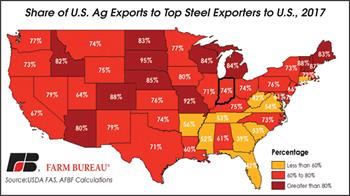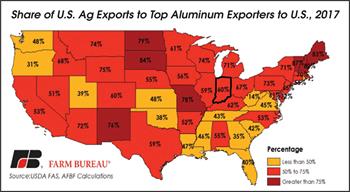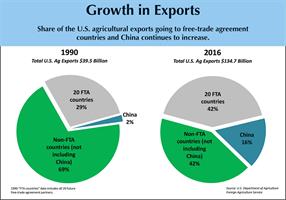Stay Informed
INFB fears trade sanctions will hurt ag exports
 It’s fair to say that President Trump’s trade sanctions on imported steel and aluminum are making Farm Bureau and many other ag groups nervous.
It’s fair to say that President Trump’s trade sanctions on imported steel and aluminum are making Farm Bureau and many other ag groups nervous.
“The bottom line is, we produce in this country and this state way more ag products than we're going to use here, and we need access to markets around the world,” said INFB President Randy Kron. “This action is serious. It can have terrible impacts. It's more than corn and soybeans – it's about livestock too.”
This is in reaction to the March 8 announcement by the Trump administration that tariffs of 25 percent and 10 percent may be applied to imports of steel and aluminum, respectively.
When a country imposes trade sanctions, countries targeted by those sanctions look for ways to retaliate. While the tariffs, according to Purdue University, could benefit U.S. steel and aluminum producers and even some manufacturers, there is a good chance that agriculture will suffer.
“If someone wants to retaliate against U.S. trade policies, agricultural trade is often the first victim,” said Bob White, INFB national government relations director.
In 2009, for example, President Obama placed a 35 percent tariff on Chinese tires after American companies complained about unfair competition, and China retaliated by imposing penalties on U.S. shipments of chicken parts.
 “Agriculture is an easy target,” White said.
“Agriculture is an easy target,” White said.
Fifty percent of the soybeans raised in the U.S. are exported, as is 21 percent of the nation’s pork, 21 percent of its corn, 16 percent of its poultry, 15 percent of its dairy and 10 percent of its beef.
An additional complication is that many of the countries that export steel and aluminum, and that are therefore possible targets of the sanctions, are good customers for U.S. ag products. The American Farm Bureau Federation made some calculations based on figures from the U.S. Department of Agriculture’s Foreign Agriculture Service and found that overall, about 70 percent of U.S. agricultural exports in 2017 went to countries that are top steel exporters to the U.S. and more than 50 percent of U.S. agricultural exports went to countries that are top aluminum exporters to the U.S.
For Indiana, the stakes are even higher: 74 percent of its ag exports went to top steel exporters and 60 percent went to top aluminum producers.
It’s also important to note that despite all the rhetoric, China is not among the major suppliers of steel and aluminum to the U.S., supplying less than 10 percent of the nation’s supplies of these commodities. The top suppliers for the U.S. are Canada, Mexico, Japan and South Korea, according to Wally Tyner, professor of agricultural economics at Purdue University.
China is, however, a major importer of U.S. commodities, particularly soybeans. In fact, 62 percent of the soybeans exported from the U.S. go to China.
 Something else that farm groups fear is that the sanctions could affect some of the trade agreements the U.S. has with other countries – and on the whole, those agreements have been good to agriculture, White said.
Something else that farm groups fear is that the sanctions could affect some of the trade agreements the U.S. has with other countries – and on the whole, those agreements have been good to agriculture, White said.
“One way to think of it is that on average, every third row that’s planted in the state of Indiana goes north to Canada or it goes south to Mexico – that’s how trade impacts us,” White said. “In 1990, which is before most of the current trade agreements were in place, that didn’t happen. Trade has a direct impact on farmers’ bottom line.”
“We're in a down farm economy right now anyway,” noted Kron. “I think break-even is about the best you plan on, and if we lose some of our markets, that could really have a drastic impact on the ag economy.
“There are no winners when we get into a trade war,” he added.
Another industry that could be adversely impacted by the tariffs is manufacturing. Something that a lot of people might not think about, noted White, is that manufacturing matters to rural America, accounting for 21 percent of non-farm rural jobs.
“That affects a lot of our members with off-farm jobs,” said White.




